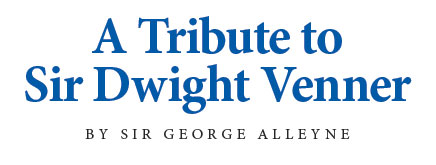 |
 |
 |
|
January 2017
|
We spoke at length just about ten days before, when we discussed his health and he assured me that he was willing and able to continue as Chair of the Campus Council of The University of the West Indies (The UWI) Open Campus and he looked forward eagerly to our University Council meeting in April. He spoke of his new library and the opportunity it gave him to sit and watch the Caribbean Sea and write about our non-aqueous ties and the nature and possible solution of some of our most pressing problems. The tragedy of a death often lies in the perception and persistence of the loss and the extent to which the one we know is missed and mourned. But if it is true that a man never dies until the last man calls his name, then we can be sure that Dwight Venner’s death will be a long time coming. His name will be called often by those who practice in the field of Caribbean human development, and although his métier was the economic dimension, Dwight knew and felt deeply that that our full development as a people embraced other dimensions. Many who listened to him in various fora, as I have, would be moved by his concern as to whether the lads who were in charge would be deaf to the imperatives which he saw so clearly. He would speak always with passion and sometimes with impatience about the examples of collective action in the OECS which were not being replicated and expanded into the wider CARICOM region. I will cite such an imperative that is one of the many which arose out of his commitment to cooperative and collective Caribbean action. The Eastern Caribbean Drug Scheme which, at least when I knew it, was hailed as the only successful example in the Americas of a group of countries coming together to acquire drugs at lower prices by collective purchasing. This was possible mainly because of the backing and guarantee given by the Eastern Caribbean Central Bank and its President Dwight Venner. The UWI is proud to claim him as one of its brilliant Pelicans. He wears our honorary degree with pride and has never been reticent about proclaiming his academic lineage. We hope that his name will be called loudly and often for a long time by the Caribbean citizens who owe him so much. We also hope that the grief of his family will be assuaged somewhat by the knowledge of our appreciation of what he did and what represented among us. Sir George Alleyne was appointed Chancellor of The University of the West Indies in 2003. Prior to this, he has had a long and illustrious career in the medical field, holding among others, the positions of Professor of Medicine at The UWI and Chairman of the Department of Medicine. He is an emeritus professor of the The UWI. |

 I had just returned from my walk on the beach where I watched the rosy-fingered dawn herald the rising of a brilliant Caribbean sun, to open my computer and learn of the setting of another brilliant Caribbean son. Caribbean he was by birth and inclination and brilliant he showed himself to be through decades of persistent and insistent efforts to foster the growth and human development of his beloved OECS, not only for their sake but for the benefit of the wider Caribbean. Sir Dwight Venner had died.
I had just returned from my walk on the beach where I watched the rosy-fingered dawn herald the rising of a brilliant Caribbean sun, to open my computer and learn of the setting of another brilliant Caribbean son. Caribbean he was by birth and inclination and brilliant he showed himself to be through decades of persistent and insistent efforts to foster the growth and human development of his beloved OECS, not only for their sake but for the benefit of the wider Caribbean. Sir Dwight Venner had died.